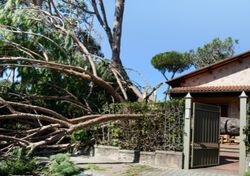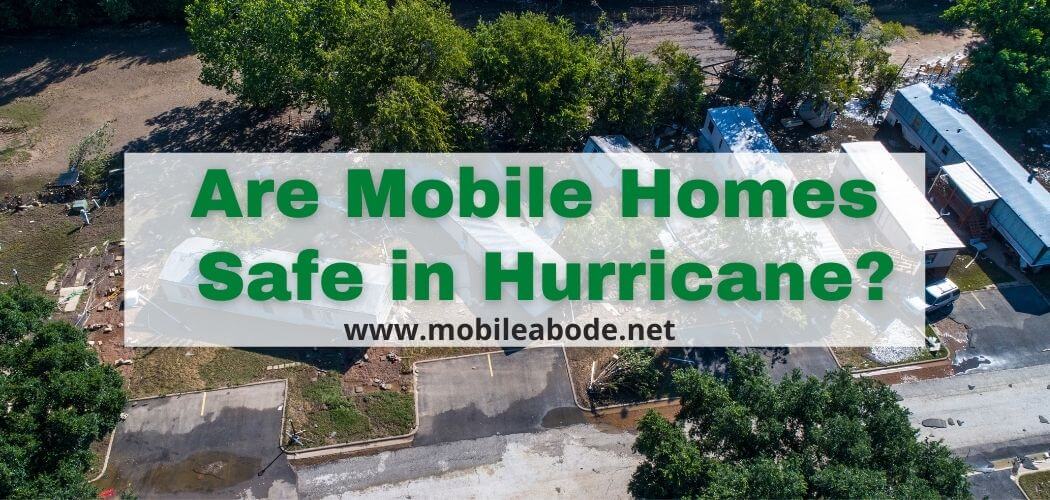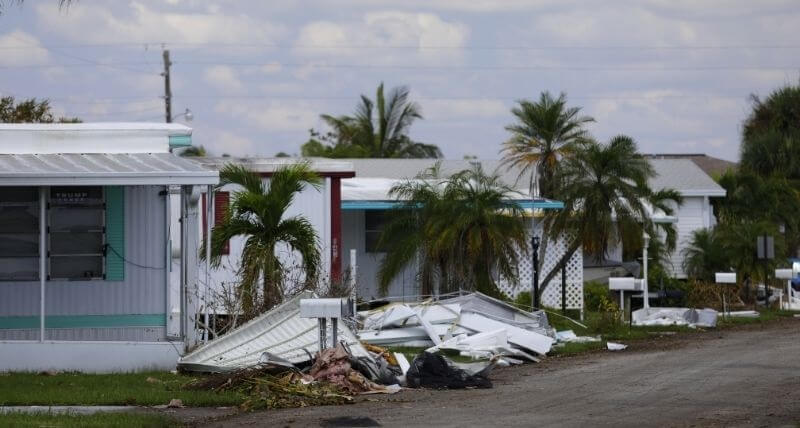Hurricane season is in full swing and it’s important to know if your mobile home is safe. Mobile homes are not as structurally sound as traditional houses, so the wind can cause serious damage.
The best way to protect your mobile home from Hurricane Season storms is by securing all major components with strong ties or straps that won’t break loose.
You should also prepare for any other natural disasters such as flooding by adding extra protection around the doors and windows of your mobile home.
The blog post will teach you how to secure your mobile home against hurricane winds and floods during this year’s hurricane season.
The question of whether mobile homes are safe in a hurricane is an important one. The answer to this question will depend on where you live and what type of home you have.
Newer mobile homes, which tend to be constructed with better materials, may fare well during a storm. Older mobile homes may not stand up as well against the wind and rain if they haven’t been upgraded or reinforced since their original construction.
[su_note]Also Read: Best Generator For Mobile Home During Hurricane[/su_note]
The best way to know for sure how your home will fare during a hurricane is by consulting with building professionals who specialize in these types of structures before disaster strikes.
How Do You Protect Your Mobile Home During Hurricane?
These are things to do for the protection of your mobile home during hurricanes.
- Strengthen the roof and exterior of your home. Repair any loose paint or panels, make sure all vents are secure to prevent water from entering inside. Takedown any yard art, wind chimes, porch swings etc. that could pick up during a storm and turn into projectiles.
- Inspect your mobile home siding for cracks that may lead to leaks when you get heavy rain in the forecasted future storms. Replace old doors with ones that have thicker metal in the middle core to protect against high winds.
- over all windows with shutters or plywood sheets securely fixed in place on both sides of each window well. Make sure your window wells are free of all furniture, debris etc. so they can function properly and leak-free.
- Clear your yard of all debris such as trash, grills, tools, toys etc. that can easily be picked up by the wind and cause damage to your mobile home or injury to you while trying to secure it.
- Ensure a clear escape for you and all members of your family where you can safely get away from the mobile home if strong winds manage to sway it off its foundation. It is advisable not to stay inside during a hurricane because there are no safe rooms built into these structures. If the mobile home is ripped from its foundation during a storm, it can easily roll over occupants causing all sorts of injuries.
- In certain cases bracing may be required especially by older homes which may not be as structurally stronger. If you are uncertain about the structural stability of your mobile home, consult with a professional to determine what type of bracing may be necessary for additional protection.
- Talk to your insurance company to make sure all items inside your mobile home are covered in the event it might suffer damage during the storm.
If they aren’t, now is the time to purchase extra coverage or make arrangements with them to take care of any damages suffered after the storm has passed.
Remember that you should never stay inside your mobile home during hurricanes; seek shelter outside until the hurricane warning passes and it’s safe to return to your residence.
Storm preparation is important for all households, especially those that live in mobile homes as they are more susceptible to damage given their lack of fixed foundations and the materials used to build them.

These include acquiring extra insurance coverage, having your septic tank emptied if you live in a community with this requirement and keeping an eye on trees surrounding your mobile home as they may fall over during a hurricane, causing serious damage or injury to yourself or your family members.
[su_note]Related Article: How To Keep Water From Running Under Mobile Home during Hurricane?[/su_note]
Can a mobile home withstand a category 1 hurricane?
Yes. The 2015 National Hurricane Center report estimates that mobile homes are 16% more resistant to strong winds compared with site-built houses. A mobile home is more vulnerable than a regular house, but some people still think they can withstand anything.
A category 1 hurricane with 120 miles per hour wind speed and rain like this: was approaching the coast and many homeowners were worried about their homes and family members.
data-preserver-spaces=”true”>Mobile homes are also designed to be attached to a single axle, meaning they can move with the wind, unlike regular houses which become immobile in the event of a hurricane.
If you live in a mobile home that’s older than 10 years or built before 1979 it could collapse if caught in strong winds. If this is your case, you should seriously consider moving out while the storm approaches and before it makes landfall.
Even though it may withstand winds up to about 135 mph, several factors may cause its collapse: age of the mobile home, damage due to previous hurricanes or earthquakes.
Does a mobile home survive in Cat 3 hurricane?
Does a mobile home survive a Cat 3 hurricane? Recent studies have shown that most, if not all, mobile homes are blown away in a category 3 storm.
The only way to make sure you and your family will be safe is to evacuate when the storm approaches. If you can’t leave, make sure you board up all windows and doors with plywood or metal shutters.
Anything less than this could result in serious injury or death; we don’t want that on our conscience.
The category 3 storm took down power lines and left many without electricity for months. Most manufactured homes are not designed to withstand a Category 3 Hurricane.
Manufactured homes may sustain significant damage from a Cat 3 storm but will often be livable if they have been properly maintained.
Homes built with proper construction materials can withstand even higher winds speeds as well as stronger rains and flooding that accompany these storms.
In addition to sturdy construction materials, manufactured homes should also come equipped with hurricane shutters or other protective measures such as anchors or straps which keep them from being blown off their foundation during strong storms.
Can a mobile home withstand 60 mph winds?
The question is absurd. A building, especially one that is not anchored into the ground would never be able to withstand wind speeds of this magnitude.
Mobile homes are supposed to be anchored very well – down to at least 140 kPa (18 psf) with 2′ x 4’s on edge with “anchor bolts” every 4 feet around the perimeter of the unit, plus strapping diagonally both ways across each wall.
That has been reduced in some places to only 100 kPa (13 psf) for non-hurricane states like California and Arkansas (LEEDS). Anchoring requirements were increased after Hurricane Andrew in 1992; but even then there were problems with the procedures, especially when the wind shifted.
But 60 mph winds are not considered hurricane force. However, sometimes the anchoring is inadequate no matter what the speed of the wind.
At best, you could expect all objects to be blown around and damage to come from flying objects – broken glass, debris.
Of course, there would be considerable danger of falling trees or telephone poles or power lines that were not felled by high winds.
Again, these happen in hurricanes and hurricanes but not necessarily in strong thunderstorms where a mobile home might get blown off its blocks if it lacks adequate anchoring procedures and equipment according to local building codes.
Is a car safer than a mobile home in a hurricane?
A car may be safer than a mobile home during a hurricane because they are usually lightweight structures that can withstand high-velocity winds that accompany hurricanes and tropical storms without being pushed off blocks or collapsing.
As opposed to houses built on concrete slabs which are usually built with utility systems that are nailed to the foundation, mobile homes have no load-bearing walls or systems attached to their slabs which makes them more susceptible to being lifted and blown away by hurricane-force winds.
However, that does not mean that they can simply withstand any amount of force. If a car is hit by a tornado and gets pushed into another object (like a house), it will most likely be destroyed as well, but studies show that cars generally fare better than houses during the hurricane.
Conclusion
Mobile homes are not safe in a hurricane. The FEMA website says “mobile homes should never be used as temporary housing following a natural disaster.”
One major concern is the fact that mobile home roofs do not have any sheathing or shingles, which makes them susceptible to wind damage and water intrusion during high winds.
They also lack substantial anchoring systems for securing the structure during high-intensity storms like hurricanes.
Lastly, they’re more likely to break apart than traditional houses because of their lightweight construction materials–making it even harder for occupants to escape before floods sweep away their property.


